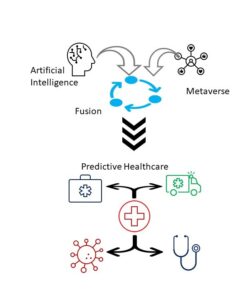 The faster maturity and stability of prominent metaverse technologies (AR, VR, Web 3.0, Blockchain, 5G Advanced, Edge Computing, etc.) associated with pioneering AI algorithms have laid a stimulating foundation for realizing digitally transformed industry houses. Healthcare is being touted as the forefront of getting thoroughly disrupted and transformed through this strategically sound fusion of metaverse and AI.
The faster maturity and stability of prominent metaverse technologies (AR, VR, Web 3.0, Blockchain, 5G Advanced, Edge Computing, etc.) associated with pioneering AI algorithms have laid a stimulating foundation for realizing digitally transformed industry houses. Healthcare is being touted as the forefront of getting thoroughly disrupted and transformed through this strategically sound fusion of metaverse and AI.
This unique combination has the innate strength to open up unprecedented opportunities for envisaging and realizing advanced healthcare facilities. Medical electronics, instruments, scanners, and equipment data gets collected, cleansed, and crunched locally by embedded and efficient AI models. This on-device data processing emits actionable insights in time. Thereby smart hospital environments can be set up and sustained. Real-time intelligent healthcare services can be dynamically developed and delivered to patients, doctors, surgeons, medical scientists, and experts. Healthcare providers can access all kinds of medical and patient data with the metaverse. Metaverse technologies and tools elegantly fulfill sharing, personalization, and collaboration requirements. Medical education is to see a drastic shift with the blending of metaverse and AI.
This convergence promotes language learning, coding/programming education, teaching support, student engagement, higher-order thinking, and collaborative learning. Integrating these state-of-the-art technologies can improve medical literacy, personalized patient care, and better health outcomes. This special issue seeks to bring together research that explores the various facets of this fusion and its implications for healthcare, medical education, and beyond.
Topics of interest include, but are not limited to, the following:
- Use of AR, VR, and AI in delivering tailored medical education.
- Adaptation of learning content to address individual learner needs and preferences.
- Personalized feedback and assessment using AI technologies.
- Integration of metaverse and extended reality technologies in language learning for healthcare professionals.
- Computational thinking and its role in healthcare.
- AI-assisted teaching support, such as answering frequently asked questions and generating questions.
- Evaluating students’ writing and performance using AI technologies.
- Enhancing student motivation and engagement through human-like interactions and natural language output.
- Developing analytical, critical thinking, and reflection skills using metaverse and extended reality technologies.
- AI-driven tools for problem-solving and decision-making in healthcare.
- AI models for biomedical image processing in healthcare
- Privacy and security in healthcare
- Fostering ethical considerations and responsible use of AI in medical education.
- Supporting group discussion and interaction using AR, VR, and AI.
- Role of the metaverse in facilitating collaborative learning experiences.
- Challenges and opportunities in collaborative learning processes in healthcare and medical education.
Guest Editors
- Khursheed Aurangzeb, King Saud University, kaurangzeb@ksu.edu.sa
- Shuihua Wang, Xi’an Jiaotong-Liverpool University; shuihuawang@ieee.org
- Yudong Zhang, Southeast University, yudongzhang@ieee.org
- Pushan Kumar Dutta, Amity University Kolkata, India pkdutta@kol.amity.edu
- Bharat Bhushan, Sharda University, India, bharat_bhushan1989@yahoo.com
Key Dates
- Deadline for Submission: 30 Nov, 2024
- First Reviews Due: 05 Feb, 2025
- Revised Manuscript Due: 01 April, 2025
- Final Decision: 01 June, 2025
